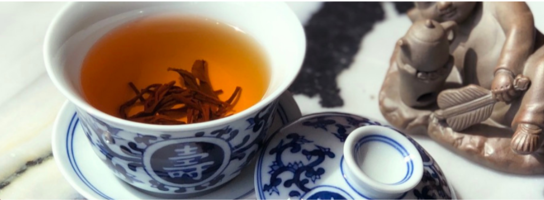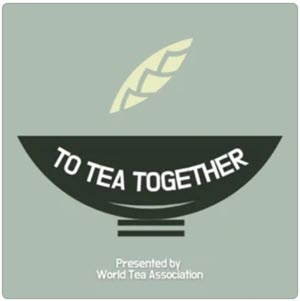William Liu is a 20-year-old sophomore at Wake Forest University so inspired by tea that he and his classmates established the World Tea Association on campus and online. The group offers tea discovery and tasting sessions weekly and hosts occasional tea panels with presentations by tea professionals, tea scholars, and tea explorers. The events bring together many who are new to tea, says William, “we aim to redefine the tea experience through an interdisciplinary approach and expose the true leaf to a greater audience.” In this segment he describes why tea appeals to young people and explains his view that tea learning is ongoing. “The tea journey has no destination,” he says, “it involves only intention and lifelong learning.”

Tea Awakening
Traveling with his mother to China awakened in William Liu a strong interest in gong fu style preparation of single-origin teas. When the 20-year-old sophomore returned to the Wake Forest University campus he discovered others were also eager to explore tea. Crawford Wheeler, who grew up in London, and Roxie Ray, who grew up in a Persian household, joined him in establishing the World Tea Association, a group that hosts weekly tastings and occasional panel discussions. William hosts a podcast on behalf of the association and continues his education in tea.
Dan Bolton: Thanks for joining us on the podcast William. Tell us the story about how you first discovered fine tea.
William: My family on my mom’s side is from Yunnan but my mom only started drinking tea in recent years. I only started drinking tea a year ago. The inspiration was a trip back to China where I was first exposed to gongfu tea. My mom brought me to various tea shops in Chengdu and Yunnan, and it was for me personally a way to connect with my cultural roots. Growing up in Canada as a Chinese Canadian, that wasn’t something that I was really aware of and so I found a greater appreciation and I realized that tea is so much more than a drink.
I realized that this type of brewing and single-origin tea isn’t common at all in the West, at least not now. I really wanted to share with my fellows on campus and that’s what led to the creation of The World Tea Association.
Dan: What is it about tea that appeals to young people?
William: A few things really capture the attention of young people, it’s new, it’s very new for a lot of young people and also the nature of tea is that it’s very healthy and the trend with our current generation right now is that we are becoming much more aware of what we are putting into our body. In other words, we’re becoming a lot more health-conscious and we’re seeking mindful practices. Brewing tea is one of those things that provides an experience that teabags are not able to do. Quality tea allows you to really sit down and reflect on life and become more mindful with the tea.
Our society right now is growing a lot more diverse and globalized. People are seeking different cultures and people are seeking new ways to do things that might be different from what they’re accustomed to and also with COVID, especially with COVID, I’ve seen a lot more young people get into tea because with COVID everyone has been forced to reflect and isolate and pretty much contemplate our life. Tea is the perfect activity to practice mindfulness and to become much more aware of ourselves.
Dan: Are they also drinking herbals and tisanes?
William: A lot of my friends consume a lot more of the tisanes and herbal tea mainly to help them to calm down. I also noticed a lot also drink, for example, chamomile to help sleep at night to get in the mood to level down. These teas usually are a lot more floral, so people like the scent, people like the sweetness of it, and that’s what attracts them.
Dan: Talk to me about the appeal of bubble tea.
William: We don’t have a lot of bubble tea shops. I do notice that bubble tea is already really big and a lot of people do gravitate towards bubble tea because it’s accessible, it’s convenient and it’s also very sweet, and so that’s one of the things that probably attracts a lot of people. It’s also a way for them to bond and to connect together similarly to how we have gone through tea as a way to socialize and to, you know, discuss what’s going on in our lives. Tea has that same purpose with a lot of people our age.
Dan: What can tea professionals do to bring more young people into the tea community?
William: I think the best way for tea professionals to bring more young people into the community is essentially just through exposure, reaching out to universities in your local cities and establishing collaborations with various groups and student organizations.
What I see right now is that a lot of people have not been exposed to it, but once they do become exposed to tea, it’s something that a lot of people become interested in. So I would say tea professionals reach out to the young people that they know, find something to connect. For example I noticed that some local tea shops would host weekly nights playing chess and serving tea. People can come in and they will sit down and while they’re playing chess they would be exposed to the environment in the shop. The tea that they consume will be the tea from the tea shop.

Bringing People Together Through Tea
The culture of tea today is present but faint and wrongly perceived. The World Tea Association redefines the tea experience through an interdisciplinary approach to expose the true leaf to a greater audience and community.
We believe that strong bonds are formed through intentional activities done together such as having tea. Conversations around tea are always insightful and introspective. We hope to create a community where tea is just as much the center as it is not.
Promoting the health benefits of tea is a core principle. Tea is more than a dose of caffeine. The physical and mental health benefits of consuming tea will always be felt.
Our vision extends beyond just drinking and sharing. To create a successful community with tea, the learning aspect must be continual and mutual. Advancing our knowledge of the leaf and keeping an open mind is important as it cultivates the quality of humility. Nobody at the World Tea Association knows everything about tea nor does anyone claim they are a “Tea Master.”
The tea journey has no destination, it involves only intention and lifelong learning.
William Liu, Founder and President
Crawford Wheeler, Vice President & Director of Coordination
Roxie Ray, Director of Marketing & Public Relations
Tyler Pruitt, Faculty Advisor & Treasurer
The TO TEA TOGETHER podcast celebrates and promotes artisanal tea culture by engaging in conversations that bring diverse minds together and bridge cross-cultural gaps over a pot of quality tea. TO TEA TOGETHER shares insightful conversations from the next generation of leaders, athletes, artists, entrepreneurs, and scholars while cultivating a new era for the appreciation of artisanal tea culture.
Share this post with your colleagues.
Signup and receive Tea Biz weekly in your inbox.

Never Miss an Episode
Subscribe wherever you enjoy podcasts:


